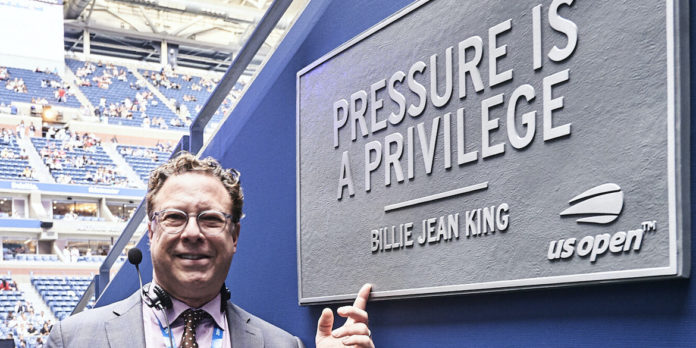
Fiur, who is openly gay, says that while he feels that these role models need not be limited to players, it is important for anyone who chooses to use their platform in this way to be actively engaged.
“You can build programs and you can get out into the local communities, but I also think about the notion that success breeds success. You’ve seen the emergence of next generation of players of color after the incredible influence that Serena and Venus have had,” he continued.
“In terms of the LGBTQ+ community, tennis is a place where there are almost no male role models. You have Brian Vahaly, who’s a former player, and as far as I know, the only openly gay male player, past or present, among American male players. You have the legends like Billie Jean King and Martina Navratilova and many other women. So the more that young people see that… that will encourage young people that may not have ever thought that this could be a sport for them.
“From the LGBTQ+ perspective, you often have to make a conscious, active decision to come out. Nobody should ever feel like they ‘have’ to come out, and that’s obviously always a big debate, whether in sports, in film or in any career. But I think at the end of the day, people who are in a position to be role models at any level, whether you’re a CEO, whether you’re a carpenter, whether you’re an elite athlete, or whether you’re just starting out in professional life, that part of serving as a role model for the LGBTQ+ community requires you to share who you are.
“I’ve become more out over time. I think that for a long period of time, it was sort of a ‘don’t ask, don’t tell’ kind of thing. I never really hid who I was, but I didn’t necessarily wear it on my sleeve. People who were close friends knew… and so when that was convenient, I did avoid it in a way. Now, I’m in a much different place. I now put it out there versus letting it passively be there. It’s been difficult at times, having very high testosterone-driven client organizations like working with the NFL. That, at times, has been intimidating for me, but I’m very grateful that with all of the individuals I’ve always worked with, that I never felt judged in any way, that I really always felt accepted for who I was.”
As the US Open’s executive producer, Fiur is constantly imagining new ways to bring the event to life each year. One of the off-court events he is most proud to have been a part of the inaugural US Open Pride in 2019 — a panel where tennis legend and WTA co-founder Billie Jean King, former NBA player Jason Collins, former MLB player Billy Bean, former ATP player Brian Vahaly, Olympic figure skating medalist Adam Rippon, and active WTA players and partners Greet Minnen and Alison van Uytvanck from Belgium spoke candidly LGBTQ+ participation in sports, including their own coming-out stories.
It was one of the latest in a long line of events that has leveraged the US Open to highlight the USTA’s commitment to inclusion and equity, and Fiur hopes that fans of all origins and backgrounds will again feel welcome on the grounds of the USTA Billie Jean King National Tennis Center this summer when the US Open opens its gates to spectators for the first time in two years.








